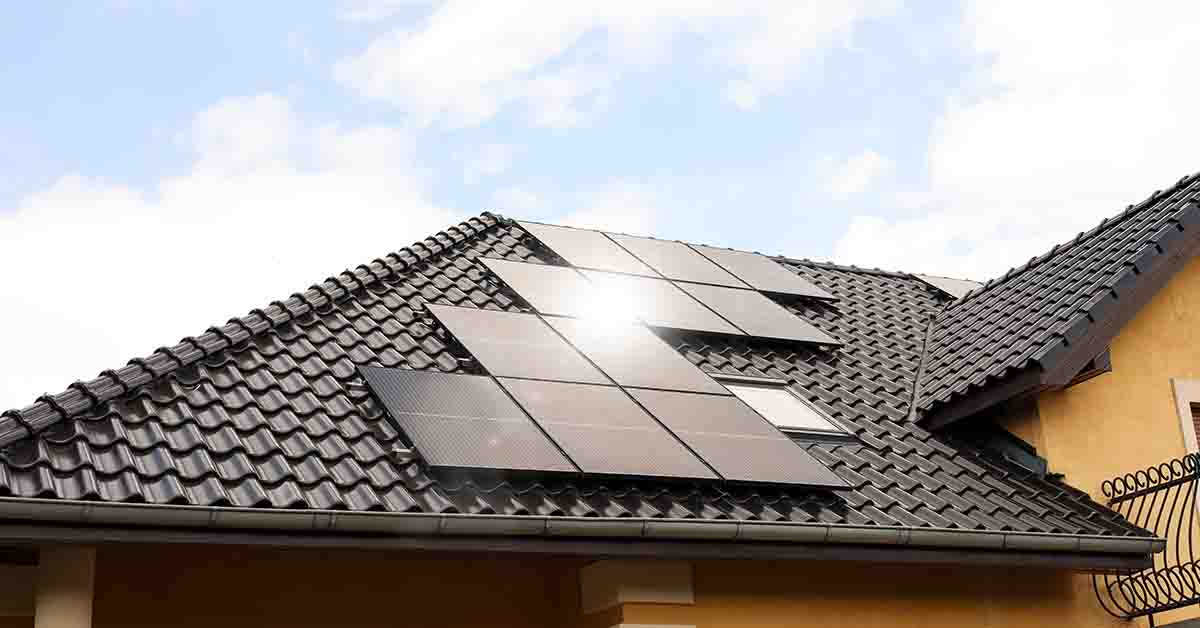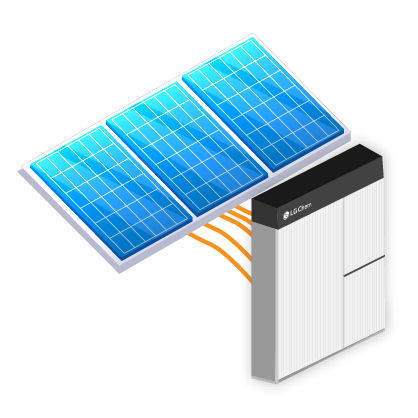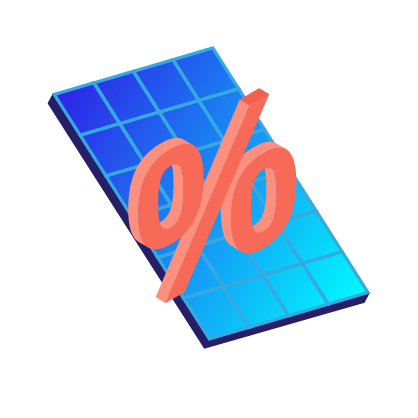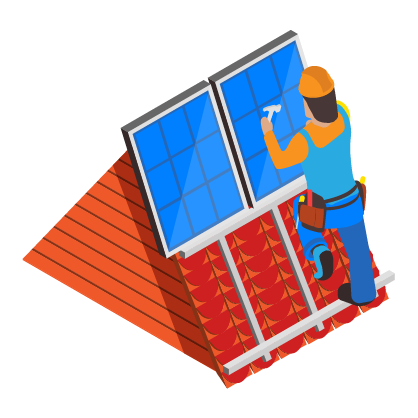Solar Panel Availability with the Solar Tax Credit Ending in 2025
The solar.com team has been carefully tracking the implications of the One Big Beautiful Bill for the residential solar industry. Given the rush of homeowners...
Read More
New Solar Trade Case Just Dropped: What it Means for Residential Solar
Coming off the heels of the signing of the One Big Beautiful Bill, a consortium of companies led by Q Cells and First Solar has...
Read More
Why Is My Electricity Bill So High?
When it comes to paying for electricity, most households are battling a two-headed monster. One of the heads is usage. We are using more and...
Read More
How Many Solar Panels Do I Need To Power a House in...
One of the first questions homeowners ask when going solar is “How many solar panels do I need to power my home?” The goal for...
Read More
Solar Panel Colors: Which Color Best Suits Your Home & Savings Goals?
When considering going solar, there are three main questions homeowners should try and answer: What is the right technology? Do I have the right contractor?...
Read More
Removing Snow from Solar Panels
Solar.com Energy Advisors get this question all the time from homeowners who live in snowy areas — “How do I remove snow from my solar...
Read More
Six Years of Solar: Lessons Learned to Help You
After working in the solar industry for well over a decade, in June 2019, I made the decision to install solar panels on my house....
Read More
Best Solar Inverters for Homeowners in 2025
While many homeowners agonize about selecting the right solar panel or battery storage system for their home, the expert Energy Advisors at solar.com know the...
Read More
A Beginner’s Guide to Buying Solar Panels in Ohio
If you’re a homeowner thinking about installing solar panels in Ohio, you’re not alone. More and more Ohioans are exploring solar energy as a way...
Read More
Metal Roofing & Solar Panels: Benefits, Costs, and FAQs
Metal roofing is growing in popularity each year, with the market being expected to reach over $5 billion by 2027. More and more households throughout...
Read More
Why Electric Vehicles and Solar Panels are a Dynamic Duo
Are solar-powered cars possible? Absolutely — but it may not be what you’re picturing. According to the National Renewable Energy Laboratory (NREL) roughly 25% of...
Read More
10 Questions To Ask Yourself Before Going Solar
Going solar can be a challenging process for homeowners — especially when speaking with different solar companies yields conflicting and confusing information. But when done...
Read More
Solar Panels on a Flat Roof: 5 Things to Know
Can you install solar panels on a flat roof? Yes, you can successfully install solar panels on the flat roof of your home or business....
Read More
When Is the Best Time to Buy Solar Panels?
The best time to own solar panels is when you receive an electricity bill for zero dollars. But when is the best time to buy...
Read More
How Much Energy Does a Solar Panel Produce?
One of the most important features of a solar panel is how much energy it can produce. After all, that’s what they’re designed to do!...
Read More
Best Solar Panels and Inverters Brands of 2024
One of the most important parts of choosing solar equipment is having confidence that the manufacturer will be around in 25-30 years to honor their...
Read More
Is It Worth Going Solar in Your Golden Years? A Retired NASA...
For many homeowners, solar panels are a long-term investment in energy cost savings. On average, it takes between 7-10 years to break-even, leaving decades to...
Read More
What Is the Best Roof Design for Solar Panels and What If...
If you’re looking to go solar at home, chances are you’re going to put those panels up on your roof. Ground-mounted solar is a great...
Read More
The Best Roof Materials for Solar Panels - 5 Common Materials
One of the first questions you’ll be asked in the process of going solar is, “What is your roof made of?” Solar can be installed...
Read More
Hyundai IONIQ 5 Charging Costs: Solar Versus Utility
With awards for safety, design, and performance, the Hyundai IONIQ 5 is perhaps the hottest electric vehicle (EV) on the market and will likely attract...
Read More
Solar Panel Warranty Guide: What You Need to Know
Going solar is a long-term investment energy savings and a clean energy future. And there’s nothing to protect that investment like a long and robust...
Read More
What Are Solar Panels Made Of?
You might know what solar panels can do – convert sunlight into energy, save money, create energy independence, increase your home’s resale value – but...
Read More
Do Solar Panels Work At Night?
Do solar panels work at night? The short answer is: no, solar energy systems only operate during the day. This is because the power from...
Read More
Charging a Tesla Model 3 With Solar Panels vs Grid Electricity
There are plenty of reasons to drive an electric car. Near the top of the list is saving time and money by charging right at...
Read More
How To Prepare for Your Introductory Call When Going Solar
An introductory call is the first step to saving money and powering your home with clean solar energy. As with any journey, the first step...
Read More
How Long Do Solar Panels Last on a House?
Like buying a house, solar panels are a long-term investment. The longer you own them, the greater the return on investment. In fact, if you...
Read More
Meet the Energy Companies Topping the Inc. 5000
Last month, the annual Inc. 5000 list was published on Inc.com. The list ranks businesses based on their revenue growth from 2013 to 2016, and...
Read More
How Many Solar Panels Does It Take To Charge an EV?
Solar panels and electric vehicles (EVs) go together like peanut butter and jelly, Batman and Robin, and peas and carrots. Charging an EV on solar...
Read More
Advantages of Using America's Most Trusted Solar Marketplace
Many people stumble upon Solar.com from a news article, a blog, a link while researching. But why would a homeowner use a service like...
Read More
Go Solar Now or Wait for Better Tech?
“Shouldn’t I wait to go solar until the costs are lower and the technology is better?” We get this question a lot at Solar.com – and...
Read More
The Value of Custom Designed Solar Systems
When customers come to us from other installers, they are always hesitant and anxious. Why? Because when you go straight to the installer they give...
Read More
When Solar Companies Compete For Your Project, You Win!
In the early years of the solar industry, the way homeowners were being sold was extremely unacceptable, and in some cases offensive. Salespeople going...
Read More
What To Ask A Solar Installer Before Signing On The Dotted Line
You’re probably reading this wondering: “What on Earth makes a Solar Company A different from Solar Company B or C?! What makes one solar installation...
Read More
3 Questions To Ask Before You Go Solar
Most solar installation companies provide financial projections to homeowners estimating what their savings will be twenty or twenty-five years after the time of installation....
Read More
4 Reasons To Use a Solar Marketplace When You Go Solar
If you’re a homeowner, chances are you’ve been approached by a solar company. Whether it was someone at your door, a salesperson in a home...
Read More
The Influence of Women in the Solar Industry
It’s International Women’s Day! Today we recognize and celebrate women all around the world. As a member of Solar.com’s female population, it’s necessary for me...
Read More
What To Look For When Choosing From The Best Solar Companies
Choosing the right solar installer can be tricky. Let’s say you are looking to remodel your home and have to decide between several contractors...
Read More
Who Are The Best Solar Panel Manufacturers?
You are a savvy consumer who wants to make sure you find the best solar panels for your home. In a lot of instances,...
Read More
How To Compare Solar Companies and Receive Solar Quotes Online
Comparing Solar Companies and Receiving Solar Quotes Online It’s easy and fun to get solar quotes online through Solar.com’s one-stop shop. Our solar online marketplace is...
Read More
Smart Panels offer Homeowners Advanced Energy Control
Solar panels and battery backup has brought home energy into a modern age. However, these advanced technologies typically tie into a rather antiquated gathering place...
Read More
Power Outages & Blackouts: How Solar + Storage Can Help
Over the last year, the US has seen an unprecedented number of power outages that left millions without power and helpless to extreme weather conditions....
Read More
2021's Top Solar Monitoring Systems
Household solar monitoring systems change the abstracts of power generation and consumption into graphics and numbers you can scroll through on an app. Hardware connected...
Read More
2021's Best Home Solar Mounting Systems
Solar panels and backup batteries get all the attention. But there’s another important piece of equipment to the home solar equation: mounting systems. These sturdy...
Read More
How To Choose The Best Solar Panels in 2023
Solar panels last a very long time and technology is always improving. How do you decide which panel is the right fit for you? Should...
Read More
REC Solar Panels: The Complete Review
Founded in Norway in 1996, REC Group is the leading European brand for Solar panels and has been providing sustainable and high-performance products, services, and, investments...
Read More
Our Solar COVID-19 Guidelines
Solar.com is committed to providing our customers with the best customer service experience in the solar industry. In light of the ongoing developments around the...
Read More
Microtops Sun Photometer Review
Solar Light’s Model 540 Microtops II® Sunphotometer is a lightweight, handy 5 channel gadget for measuring and assessing direct solar irradiance, aerosol optical thickness, and...
Read More
Top Solar Panels of 2018 & 2019
Top Solar Panels 2019 & 2018: An Overview As we’re wrapping up the year here at Solar.com, we’ve been reflecting on the last two years...
Read More
Going Solar in These Top 10 States Will Increase Your Home Property...
According to a recent report by Solar Energy Industries Association (SEIA), the U.S. installed 2.1 GW of solar capacity in Q2. The solar industry reached...
Read More
Q CELLS Opens New 1.7 GW Factory in Dalton, Georgia
South Korean solar panel manufacturer, Q CELLS, recently celebrated a monumental milestone last month. The company opened their fourth solar factory in *drum roll please*...
Read More
4 Cool New Technologies from Solar Power International (SPI) 2019
Our team just returned from a very exciting trip to the Solar Power International 2019 Convention in Salt Lake City, Utah. We toured the floor...
Read More
U.S. Installed Solar Capacity: 2 Million Milestone
According to the most recent data released by Wood Mackenzie Power & Renewables and the Solar Energy Industries Association (SEIA), the residential solar market in...
Read More
Solar Subcontractors: Should I use one to go solar?
So, you’re interested in starting a solar project and now you’re wondering, “who should be doing the installation work?” Well, more and more companies...
Read More
5 Most Popular Solar Panels Chosen by Homeowners in 2018
Homeowners demand a lot from the solar panels they select for their rooftop system. These panels need to look good and perform well over multiple decades! Here...
Read More
Better Looking Solar Panels: System Aesthetics Comparison
As a homeowner, solar panel efficiency and cost may not be the only two factors you’re considering when deciding whether or not to go...
Read More
SolarEdge Inverters: The Complete Review
SolarEdge is an Israeli-based company offering PV solar inverters. Currently providing almost 90 percent of all residential power inverter needs, SolarEdge has quite the...
Read More
Mission Solar Energy: The Complete Review
Mission Solar Energy, a U.S. Photovoltaic (PV) solar module company based in San Antonio, designs, engineers and assembles high-quality solar modules that are well suited...
Read More
Hyundai Solar: The Complete Review
Hyundai Solar began in 2005 by Hyundai Heavy Industries (HHI), a popular player in the heavy industries sector, with production centers in Eumseong, Korea. As...
Read More
Brooklyn Solar Works Solar Canopy: The Comprehensive Review
As everyone knows, space is tough to come by in New York City. The same holds true when designing rooftop solar arrays. The city is...
Read More
The 3 Most Efficient Solar Panels for Your Home
Modules have come a long way since the 1960s when the first solar panels maxed out at 14% efficiency. While higher efficiencies sound better, what...
Read More
8 Awesome New Technologies from Solar Power International 2018
Today, the Solar.com team took a break from our solar designs for a quick trip down to Anaheim for Solar Power International 2018. We...
Read More
JA Solar: The Comprehensive Review
Founded in May 2005 and later listed on the New York Stock Exchange in 2007, JA Solar is a globally recognized manufacturer of solar...
Read More
Canadian Solar: The Comprehensive Review
While there are numerous solar panel companies on the market, Canadian Solar is definitely a top player in the industry. Beyond manufacturing quality panels, Canadian...
Read More
Bacteria-enhanced Solar Can Boost Production in Cloudy Skies
In May 2018, researchers at the University of British Columbia discovered a new way to build solar cells that incorporate bacteria. Yes, germs… But...
Read More
JinkoSolar: The Comprehensive Review
JinkoSolar is a manufacturer and global supplier of solar modules. They are headquartered out of Shanghai, China and employ over 12,000 across their 8 production...
Read More
Community Solar Farms Gaining Popularity in New York
According to the Solar Energy Industries Association, by the end of 2018, there should be close to 2 million solar installations in the United States....
Read More
How Do Wind and Humidity Affect Solar Panel Efficiency?
Several factors play into solar panel efficiency. The type of solar cells and how the panels are constructed are the most important factors in how...
Read More
Does Solar Panel Temperature Coefficient Matter?
If you are trying to maximize the amount of energy that your solar panel system can generate, then your solar panel’s temperature coefficient is...
Read More
The Latest Update in Flexible Solar Cells for Your Smart Devices
As solar increases in popularity across the world, more investments are being funneled into the development of solar cell technology. The goal is to...
Read More
Do Solar Panels Work Less Efficiently at Certain Temperatures?
It’s easy to confuse heat energy and light energy since we often experience them in tandem. But when it comes to solar panels, there...
Read More
The Essentials of Passive Solar Home Design
In the process of designing a home, there are a number of strategies that can be implemented to minimize the amount of energy required to...
Read More
South Korea's Q CELLS to Open Georgia Solar Factory
In the wake of US tariffs on non-domestic solar modules, Q CELLS is opening a solar module factory in Georgia. The South Korean company announced...
Read More
Space-Based Solar vs. Conventional Solar - How Are They Different?
We all are familiar with residential and commercial solar panels. They can be found all around states like California, New York, Massachusetts, and more....
Read More
How Solar Panels Absorb and Store Energy
The sun’s energy is expressed in different ways, depending on what materials it interacts with. Solar panels are built with materials that physically interact...
Read More
Perovskite and Silicon Solar Cell Efficiency Reaches 25.2%
While around 90% of solar panels currently on the market are made out of silicon, adding a new material may soon make existing module design...
Read More
What Direction Should My Solar Panels Face?
When you make the decision to install a solar panel system at your home, there are going to be several questions on your mind. How...
Read More
How are solar panels manufactured?
You know solar panels as the futuristic-looking black or blue rectangles that soak up sunlight and bring down your energy bills. You might even get...
Read More
DIY Soda Can Solar Thermal Panels
Are you inclined to tinker on backyard projects? Is it something you’re curious about? Here’s a fun DIY solar project (featuring soda cans) that might...
Read More
India Gets Serious About Solar
According to Indian Prime Minister Narendra Modi, India is on track to install 200 gigawatts of renewable capacity by 2020. The country is fully embracing...
Read More
Can My Solar Panels Withstand a Hurricane?
If you live in an area that experiences extreme weather like hurricanes, hail, thunderstorms, blizzards, heavy winds and more, then you should take the...
Read More
Why Are Solar Panels Blue?
If you have ever driven through a residential neighborhood in states like California, Arizona, North Carolina, or any of the other top states for solar,...
Read More
What Solar Options Are There Besides Rooftop Solar?
When you think of solar, you probably imagine a solar panel-lined rooftop. For many homeowners, rooftop solar is usually the way to go. But it...
Read More
Brand Battle: Hyundai vs. Panasonic Solar Panels
Hyundai and Panasonic are trusted brands and they’ve both expanded into the solar panel industry. Offering quality products for two different price points, each brand...
Read More
Why New York Loves SunPower Solar Panels
New York loves its Yankees — and its Sunpower solar panels. A recent review of the Solar.com platform showed that homeowners in New York state...
Read More
Should I Get a Solar Thermal System Instead of a PV System?
When you hear about installing solar, you’re most likely hearing about PV (photovoltaic) solar cell panels. They’ve become standard in the industry. PV solar cell...
Read More
Everything You Need to Know About Solar Carports
The increasing adoption rate of solar technology has led to both surprising innovations as well as obvious and practical applications. One such application of...
Read More
How to Conduct Due Diligence on Your Solar Project
Once you’ve decided to install a solar panel system at your home, the next thing to focus on is conducting the proper due diligence on...
Read More
California HOA Rules for Solar: New Law Makes Going Solar Easier
If you live in a condo, you may think that solar is beyond your reach thanks to homeowners association (HOA) regulations. After all, they didn’t...
Read More
Full Review of Sistine Solar Skins - MIT Startup Makes Solar (Even...
We at Solar.com already think solar panels are pretty beautiful – their cost savings and sustainability alone make them gorgeous in our eyes. However, The...
Read More
A Complete Review of the NEW SolarEdge EV Charging Single Phase Inverter
For electric vehicle (EV) owners, having convenient access to a charging station is as important as a normal driver having access to a gas station....
Read More
How Utility API Works With Your Utility and Solar Company
Utility API provides software to accelerate the clean energy movement. They do this, in part, by offering secure data on a homeowner’s energy usage to...
Read More
What's the Size of a Solar Panel? Solar Panel Size and Weight...
If you are thinking about installing a solar panel system at your home, one of the first things you must consider is how much...
Read More
Kitty Hawk's Cora: An Autonomous, Completely Electric Air Taxi Takes Flight
Flying cars have captured society’s imagination as a far-off possibility for decades, but that dream is quickly nearing reality. Earlier this month Silicon Valley startup...
Read More
American Solar Panel Manufacturers - 2018 Complete List
There are many reasons why a consumer may want to purchase their solar panels from an American manufacturer or from American Solar brands. They want...
Read More
A Guide to Solar Panel Mounts
Solar panel mounts are a common component of almost every solar panel array. Although there are newer solar panel technologies coming out that do not...
Read More
SoCal Edison's $10,000 BMW i3 Incentive
In February 2011, BMW introduced its new sub-brand, BMW i. This sub-brand’s purpose was to focus on marketing and selling a new line of plug-in...
Read More
Top 3 Solar Inverters Selected Through Solar.com in 2017
Solar panels are a fairly familiar concept and many of us have an idea on top solar panel manufacturer, but inverters are a little...
Read More
Top 5 Solar Panels Selected Through Solar.com in 2017
Curious which solar panels are selected most on the Solar.com platform? As an online marketplace connecting quality solar companies to customers, we stay neutral...
Read More
What Is A Solar Panel Farm?
Each year, there are newer and more powerful solar technologies made available for individuals and consumers. These solar solutions are not just limited to rooftop...
Read More
SunPower Solar Panels vs. LG Solar Panels - 2018 Update
SunPower and LG are two of the top companies making solar panels. You’ve probably come across them in your research, and you’re wondering which will...
Read More
Going Solar in San Diego Gas and Electric Territory
Did you know that 30 percent of San Diego’s power comes from renewable sources? Contributing to that growing number is easier than ever. Switching to...
Read More
PG&E Home Solar and Electric Vehicle Rates Rundown
After much deliberation, California’s Pacific Gas & Electric has begun rolling out its updated residential and commercial rates. As there is little opposition to the...
Read More
How Blockchain And Solar Can Work Together
Many would consider 2017 to be the year of cryptocurrency. Coins like Bitcoin, Litecoin, Ripple and dozens of others have shot up 1,000%+ and do...
Read More
The Craziest Solar Technologies Coming in 2018
Solar technology has been in existence since 1876 when William Grylls Adams and his student researcher discovered that you can produce electricity by exposing selenium to...
Read More
3 Solar Panel Innovations to Look for in 2018
Solar energy is taking shape across industries and geographies. Engineers at top solar panel companies are hard at work developing innovations making solar even more...
Read More
Why Your Solar Provider Needs to be NABCEP Certified
After picking the best solar equipment and design for your home, it’s time to pick the right installer. A good installer will make installation a...
Read More
6 of the Most Common Solar FAQs
Solar is now more affordable and practical for the consumer than ever before, and because of this, it is starting to make sense to think...
Read More
Top Portable Solar Panels for Under $200
As the fundamental technology behind solar improved, a number of new consumer devices started hitting the market. One such device was the portable solar panel....
Read More
EV Charging Everywhere: An Interview with Heather Hochrein, EVmatch CEO
We sat down with Heather Hochrein, CEO and co-founder of EVmatch, to learn more about her Santa Barbara company and the opportunity of EV charging...
Read More
An Overview of Panasonic's Solar Panel Offerings
With all of the advances in the solar industry, it is getting more practical and affordable to start using solar. In fact, the price of...
Read More
How I Found Top Solar Providers Near Me
The following post is a testimonial from a user of Solar.com’s Solar Savings Calculator. I never thought I would be someone to search for solar...
Read More
Smappee vs. Sense vs. CURB Home Energy Monitor Comparison
Whether or not you’ve made the decision to go solar, knowing exactly where your electricity is used can help you save on energy bills by...
Read More
Mass Solar Connect: Compare Solar Companies in Massachusetts
The Massachusetts Clean Energy Center (MassCEC) has teamed up with Solar.com and local nonprofits Self Reliance and the Marion Institute to officially launch Mass Solar...
Read More
Monocrystalline Solar Panels vs Polycrystalline Solar Panels
Over six decades ago, New Jersey scientists announced their invention of a practical silicon solar panel. Solar panels have come a long way since then,...
Read More
5 Reasons to Consider a Career in the Solar Industry
Solar energy, unfortunately, is still viewed as an alternate power source. However, in spite of this designation, it is quickly becoming the primary source of...
Read More
Installing Solar in Nepal
Working in the energy sector in America can be fast paced. It is primarily focused on reducing homeowners energy bills. Cost is king. My days...
Read More
How To Properly Evaluate Solar Panel Companies
There are so many details to take into account when choosing the right solar system for you. One of the most important factors is,...
Read More
4 Factors That Can Affect Solar Panel Production
Not all solar panels are created equal. Power ratings, efficiency ratings, and degradation rates are just a few of the qualifications that set solar panels...
Read More
Cost of a Tesla Solar Roof vs Solar Panels
There’s no question that the Tesla Solar Roof is among the best looking rooftop solar systems on the market. When it was unveiled in 2016,...
Read More
Installing Solar On Spanish Tile Roofs
Spanish tile refers to the style of the tile, not the material. Spanish tile is usually made of either clay or concrete. Installing a solar...
Read More
Invisible Solar Cells - What Are They?
We have come a very long way from the first line of solar panels. Despite their sustainability, the first solar panels were not the most...
Read More
The 4 Roof Types Released By The Tesla Solar Program
Tesla has finally made its solar roofs open for ordering. The smooth and textured tiles are the only roof types currently available with the Tuscan...
Read More
Production vs. Performance Guarantees
Uncertainties are given when making a big ticket purchase that lasts 30 plus years. Whether that is a home, a vehicle, or financial investments. How...
Read More
Solar Panels For Boats and Yachts
The purchase of a boat or a yacht is a coveted purchase for many people. While it certainly adds a new dynamic to one’s life,...
Read More
Amazon Has Finally Decided To Become A Leader in Renewable Energy
Back in 2015, Greenpeace did a sophisticated research project on the sustainability of the top tech giants in the United States. It covered many areas of sustainability,...
Read More
Here Is What Elon Musk and the Tesla Solar Program Have Been...
Every time the name Elon Musk is thrown around, most people will think of either his connection to PayPal, SpaceX, or Tesla cars. But now...
Read More
Solar Backup Power - Will My Solar Panels Work in a Grid...
Solar photovoltaic panels are created to absorb the sun’s energy and convert it to usable AC energy in your home. You may be wondering then,...
Read More
A Review of LG Solar Panels - When Brand Name Does Matter
LG is a brand you may already be familiar with. They are a South Korean multinational manufacturer that makes televisions, mobile devices, tablets, smartwatches and...
Read More
Will Tesla's Solar Panels Change The Industry?
On October 28, 2016, Elon Musk unveiled Tesla’s solar roof product – a line of roof tiles and shingles with embedded photovoltaic cells. To an...
Read More
Electrical Panel Upgrades for Solar: A Technical Case Study
John Smith is a homeowner in California looking to reduce his electric bill by going solar and he decided to call an installation company that...
Read More
SunPower Solar Panels vs. LG Solar Panels
If you are considering installing a solar system at your home or place of business, then you have many factors to consider. The paramount factor...
Read More
Is SunPower Still The Best Solar Company For Solar Panels?
You’ve heard of SunPower, LG, SolarWorld, Q CELLS, and maybe even Canadian Solar, but which one is the right fit for your home? To figure...
Read More
Microinverter vs String Inverter: Which is Right For Your Solar System?
A common decision you’ll have to make when designing your custom solar system is whether to use microinverters or string inverters. The basic function of...
Read More
How Do Solar Panels Produce Electricity?
Solar panels contain cells of semiconductive material, usually, silicon usually encased in a metallic frame and tempered glass. When subject to sunlight, photovoltaic cells create...
Read More
What is a Power Optimizer?
When deciding on solar equipment it’s important to know what options are available. Different equipment suits different situations better. A power optimizer is ideal...
Read More
Solar.Com RFP - Conejo Valley Group Buy Program
Solar.com is launching another solar Group Buy Program in specific targeted markets in order to aggregate latent demand for residential solar power systems and provide...
Read More
Driving on Sunshine: Comparing the Economics of Gas and Electric Vehicles
Driving an electric car charged by solar panels on your roof sounds like the dream – you are now driving to work in a vehicle...
Read More
Tesla's Solar Roof Rivals
Elon Musk once again shook up the energy industry with the unveiling of solar roofs by Tesla and SolarCity on October 28th. Building Integrated Photovoltaics...
Read More
What Trump's Presidency Means for the Solar Industry
The election of Donald Trump to the office of President of the United States is expected to have a profound impact on the future of...
Read More
Will Tesla Shake up Solar Roofing?
We’ve seen this before. Last year, Tesla CEO Elon Musk announced that his electric vehicle company would branch out and start supplying a home battery...
Read More
The Solar Win-Win: Online Marketplace Benefits Installer and Homeowner
The solar market is expanding as homeowners are installing rooftop solar panels in an attempt to reduce their electric bills and their carbon footprint. However,...
Read More
Importance of Power Tolerance in Solar Panels
This paper highlights the importance of power tolerance when choosing solar panels. Power tolerance is a measure of how much electrical power a solar panel...
Read More
Gauging the Bankability of Small to Mid-Sized Solar Installers
The entire world is going green and moving toward cleaner sources of energy. California hosts a flourishing solar industry with a burgeoning number of solar...
Read More
Ann Arbor Takes Steps to Promote Residential Solar
Home to Michigan’s largest solar panel array of 1.1 MW and one of the top green research universities in the country, Ann Arbor has a...
Read More
Measuring Home Energy Use
One of the most important steps before installing home solar is figuring out how much energy your home uses, and how big your solar energy...
Read More
My Installer vs. The Perfect Installer
Every solar installer has an opinion about how to choose a solar installer. Those with the most service time under their belts and those who’ve...
Read More
How to Choose A High Quality Solar Installer
Tip 1 – Ask Friends, Families, and Neighbors If you live in California then there’s a good chance that you know somebody who has already...
Read More
Three Things to Avoid When Installing Your Solar Panel System
At Solar.com, we have a lot of experience in the solar panel industry. Every day we help people to install panels on their homes, and...
Read More
The Benefits of Floating Solar Panels
Floating solar panels utilize the same technology as the panels that you put on your roof. The main difference is that they’ve been adapted...
Read More
The Top Three Solar Manufacturers
At Solar.com, we believe in supplying quality equipment for our customers. In the last twenty years, solar technology has grown exponentially, costs have plummeted, and...
Read More
Why "Falling Back" is Bad for Solar
With daylight savings recently ending, it is that time of year again to reflect on why “falling back” is a really bad idea. In the...
Read More
Elon Musk's Gigafactory Should Be Dictating Your Solar Equipment
All solar installations today should be thinking ahead to the not-so-distant future. The main question to be asking is whether your solar system will seamlessly...
Read More
The Solar “Tipping Point” is Looming
We all know why people go solar: investment purposes, immediate savings, environmental concerns, and grid independence. But who are these people? One of Malcom Gladwell’s...
Read More
4 Mistakes Homeowners Make When Going Solar
Buying a solar system for your home can be a confusing process. At Solar.com we’re committed to helping homeowners sort through it all and...
Read More
Does Solar Panel Efficiency Really Matter?
Installers who sell high-efficiency panels love to flaunt that point when selling their system. But in most cases, panel efficiency doesn’t count for much, except...
Read More
Why Choosing the Right Solar Installer is So Important
The quality of work put forth by your solar installer is the most important aspect of your solar installation. An inverter malfunction or dirty...
Read More
Solar Installation Horror Story
The following letter is from a very reputable company in Solar.com’s installer network to a homeowner who was unfortunately taken advantage of by an installer...
Read More
Bankability: What it Means and Why it is Important for Your Solar...
Homeowners who are considering solar typically overlook the manufacturer of their solar panels, despite this being one of the most important factors for the longevity...
Read More
How ‘Big Data’ Will Change The Solar Industry
The U.S. Department of Energy invests in new technology to revolutionize the landscape of solar data. Reliable solar grid data, the true performance of solar...
Read More
Los Angeles Solar Installation Permit Process About to Get Easier
Here at Solar.com, we want to see solar panels on every compatible rooftop in the U.S. And while our plans for expansion are ambitious,...
Read More














